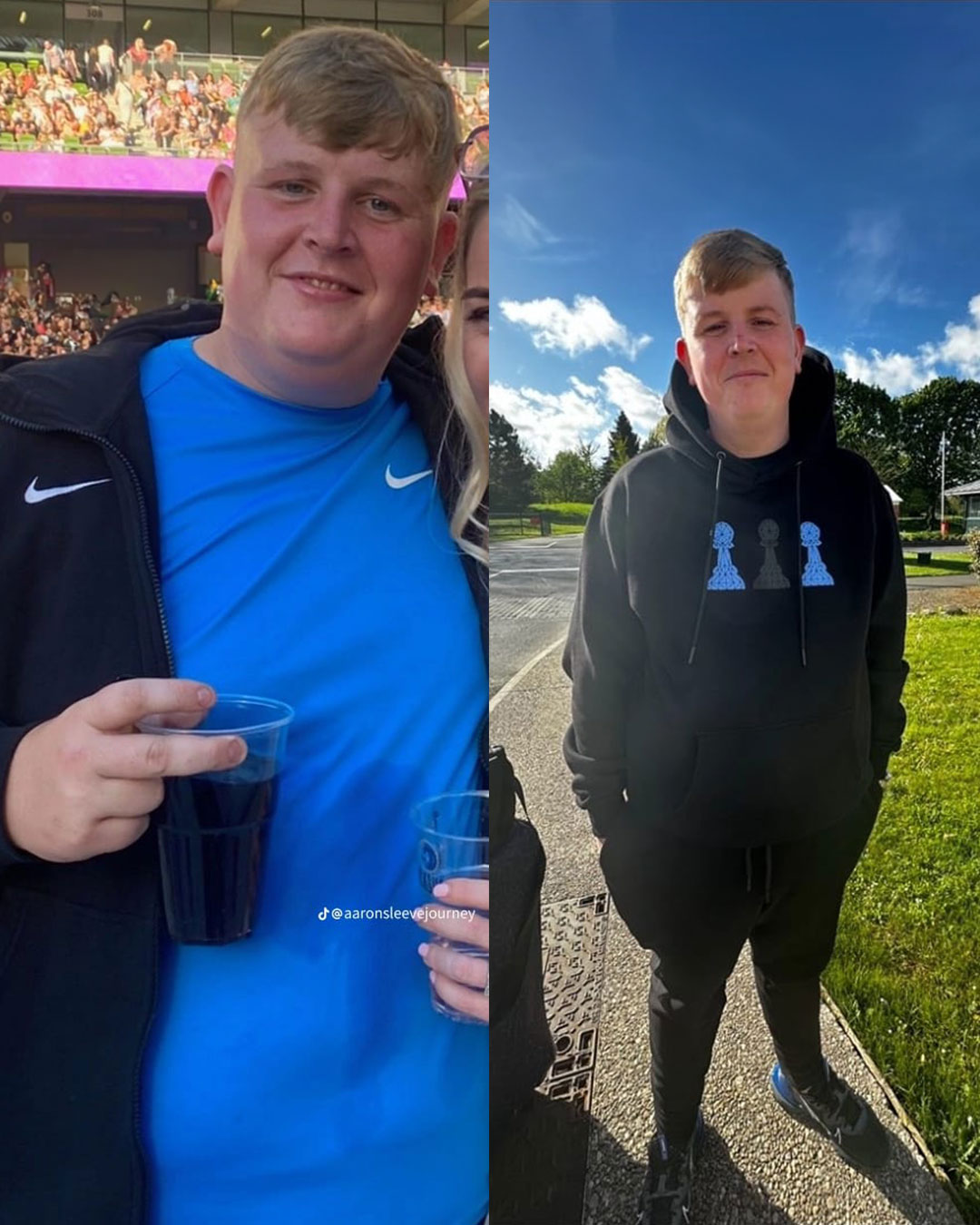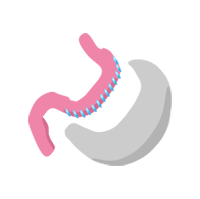Bariatric Surgery In Ireland
Achieve Long Lasting Weight Loss Results Efficiently
Excellent 4.8 out of 5

Trusted by 35,000+ Irish Patients Since 2001
Weight Loss Surgery At A Glance
Our Locations
Dublin, Limerick & Kilkenny
Consultation
Online & In-hospital
Operation
1 to 2 Hours
Weight Loss
60-70%
Anaesthesia
General
Hospital Stay
1 night
Avg.Recovery
2 Weeks
Price
From €297/month

Full insurance provided for your peace of mind.

Meet Your Weight Loss Surgeon
Having worked in New York and London, Dr Loy is delighted to bring his international expertise home to Ireland.
Dr. Loy is originally from Antrim and operating full-time at Auralia.
He leads the way in cutting edge surgical techniques, helping his patients with Gastric Sleeve, Bypass , and more, always with a personalised approach.
+2,740 successful procedures
Member of the Royal College of Surgeons
Online and In person consultations are available

+2,740 successful procedures
Member of the Royal College of Surgeons
Senior Lecturer at Queen Mary University, London
The Benefits Of Our Weight Loss Surgeries
Life Changing Weight Loss Stories from Our Patients


Susan
Lost 7.5st in 7 months


Katrina
Lost 12st in 1 year


Aaron
Lost 7st in 7 months
Watch Susan's Full Weight Loss Surgery Story
Start Your Own Weight Loss Journey Today!
Katrina's Weight Loss Story with Auralia


I have struggled with my weight my entire life, and it had completely spiralled out of control, peaking at 26st 7lbs.
1 year later and almost 12st less, I can safely say that having this surgery almost certainly saved my life. I had high BP and was pre-diabetic, both of which has been comfortably reversed without medication.
I will be forever grateful to my team at Auralia for giving me back the control over my life that I had lost, and I can’t recommend them enough.Katrina Darcy
Popular Bariatric Surgeries At Auralia

Gastric Sleeve Surgery
The gastric sleeve procedure involves reducing the size of your stomach by approximately 80%, creating a smaller, sleeve-shaped stomach. This limits the amount of food you can eat and reduces hunger hormones, helping you feel satisfied with smaller portions.

Gastric Bypass Surgery
Gastric bypass creates a small stomach pouch and reroutes part of your digestive system, reducing both the amount you can eat and the calories your body absorbs. It can be particularly suitable for patients with type 2 diabetes or significant acid reflux.

Revision Surgery
If you’ve had previous weight loss surgery that hasn’t delivered the results you hoped for, or if complications have arisen, revision surgery may be an option. Our experienced surgeons can assess your situation and discuss potential solutions.
You're not sure which procedure is the right option for you?
Many patients come to us uncertain about which procedure is most suitable for their goals, health profile, and lifestyle. That’s completely normal. Your free consultation is designed to give you clarity.

During your consultation, your bariatric doctor will:
- Review your medical history and weight loss journey
- Explain each option work in details
- Discuss which procedure may be more suitable for you based on your BMI, health conditions, and personal goals
- Answer all your questions in plain language
- Provide a clear recommendation with no pressure to proceed

Why Patients Trust Auralia With Their Weight Loss
Unmatched Experience
25 years of experience and over 35,000 procedures performed.
International Accreditation
Internationally accredited private hospital with state of the art the facilities. No long waiting lists!
Expert Team
A full experienced medical team led by one of Ireland’s most experienced bariatric consultant.
All-Inclusive Package
Surgeon, theatre, & aftercare with monthly payment options—no hidden fees.
Personalised Care
Custom support from consultation to recovery, designed for you.
Patient Centric
A welcoming, judgment-free environment where your goals are always the priority
Have a virtual tour at
Our State Of The Art Facility
1st Internationally Accredited Private Hospital in Ireland



- 3 Locations Across Ireland
- Online & In-Person Consultations
- 25 Years of Experience
- 3 Locations Across Ireland
- Online & In-Person Consultations
- 25 Years of Experience
Featured In
















Bariatric Surgery Cost & Finance in Ireland
The Weight Loss Care Plan. Everything included. No hidden fees.
✦ Weight Loss Surgery Care Plan ✦
✦ Consultant surgeon assessment and pre-operative tests
✦ Free consultations
✦ Hospital, anaesthesia, dedicated bariatric theatre
✦ Post-operative night in hospital
✦ Dietitian programme and supplement guidance
✦ Auralia App : Access to exercise, lifestyle & cooking classes from your home
✦ Surgical insurance post operation
✦ Scheduled follow-ups and full Irish aftercare
From €297 per month
Finance options (up to 36 months)
We’ll handle everything with you, so it feels simple and stress-free
Thinking About Weight Loss Surgery Abroad?
Compare the full picture before you travel. Your result depends on care before, during, after surgery.

Recognition of life-threatening complications
Auralia (Ireland)
Your team can examine you immediately if pain, fever, fast heart rate, or vomiting develops, critical for early detection of leak/bleed/PE.
Abroad
Problems often appear after you fly home. Delays in assessment increase the chance of severe outcomes.
Emergency pathways & re-admission
Auralia (Ireland)
Direct re-admission to the operating surgeon’s team, with access to theatre, imaging, and bariatric anaesthesia.
Abroad
You present to an ED with no continuity, the local team may not have your operative details or the original surgeon.
Post-op travel risk (clots & pulmonary embolism)
Auralia (Ireland)
No long-haul flights after surgery; DVT prevention and mobilisation are coordinated by your team.
Abroad
Early post-op flying increases clot risk. Some providers still discharge to travel within days.
Standards, governance & accountability
Auralia (Ireland)
ISO and CHKS certified systems, audit, infection control, and clear regulatory oversight.
Abroad
Standards vary by country/provider, verification can be difficult, and accountability may be unclear once you return.
Structured aftercare (the biggest driver of long-term success)
Auralia (Ireland)
Dietitian-led plan, scheduled bloods, supplements, and direct contact with your bariatric team.
Abroad
Aftercare is remote or limited; gaps increase risks of deficiency, reflux issues, and weight regain.
The “Cold facts” box
Serious complications can look mild at first. Hours matter, distance adds delay.
Flying soon after surgery raises clot risk, prolonged sitting and dehydration make it worse.
Most surgical emergencies are safest with your original team, not a new hospital without your notes.
Cost comes second—but here’s the full picture
When you include flights, hotels, time off work, companion travel, and the real cost of a complication managed away from the operating team, “cheap” trips are rarely cheaper. In Ireland, you get a complete package, finance options, and accountable follow-up.
Your life and long-term health come first. Choose the pathway with immediate access to the team who operated on you.
Your Weight Loss Journey With Auralia
Step 1.
Free consultation with your doctor
You can have your consultation either from home via Zoom or in person at our private hospital (Dublin, Kilkenny, & Limerick). In this first appointment, you’ll meet your doctor, review your health history and goals, then agree on the next steps together.
To start your weight loss process, firstly request your free consultation by calling us on (01) 612 0551 or filling a consultation request form here.
A patient coordinator will call you back to arrange your free consultation online or in-hospital.
Step 2.
Convenient local pre-op tests
You will need blood tests and scans completed prior to surgery. Our team will provide you with all the required instructions and referrals, making this step hassle-free.
Step 3.
Procedure Day
On your procedure day, you’ll have a dedicated medical team to take care of you.
Step 4.
Recovery & Aftercare
Your support continues long after the surgery. You’ll receive a full recovery plan, 24/7 access to our medical bariatric team via an emergency number, remote follow-up through our weight-loss app, and in-person medical reviews at our private hospital when needed.
Auralia's Weight Loss App
Everything you need throughout your journey from the comfort of your home!
Our Auralia Weight Loss App is designed to help you achieve lasting results by supporting every aspect of your weight loss journey. More than just a tracking tool, it’s a holistic companion that keeps you motivated, informed, and connected to your care team.

- Nutritional classes (live & pre-recorded)
- Exercise classes (live & pre-recorded)
- Mindset classes (live & pre-recorded)
- Healthy recipes and Cooking classes
- Food diary and Weight loss tracker
- Dietician appointments
- Instant messaging service with your dietician

How obesity affects your life
Obesity can have many serious consequences on your body like :
Certain cancers (breast, colon and endometrial)
Heart disease and strokes
Substantial disability
Sleep apnea
Type 2 diabetes
Fatty liver disease
Obesity doesn’t only affect you physically, it can also take a real emotional and psychological toll causing depression, social isolation, shame and guilt!
Obesity is a serious matter, and it’s time for you to take action against it!
More Inspirational Stories from Our Patients!







Weight Loss Surgery FAQs
Bariatric surgery, also called weight loss surgery, is a medical treatment for severe obesity that helps you lose weight by making your stomach smaller and, in some procedures, changing how food is absorbed.
Bariatric surgery is one of the most commonly performed procedures worldwide, with a strong safety record when performed by experienced surgeons. As with any surgery, there are risks, including infection, bleeding, and complications related to anaesthesia. Serious complications are rare.
At Auralia, our surgeons have performed thousands of procedures over 25+ years. We use minimally invasive laparoscopic techniques, operate in accredited facilities under Irish healthcare regulations, and include comprehensive insurance cover in your programme (terms apply) for added protection.
Your surgeon will discuss specific risks relevant to your health profile during your consultation.
Beyond weight loss, bariatric surgery can improve or help control several obesity-related conditions, especially type 2 diabetes, high blood pressure, sleep apnoea, heart disease, and abnormal cholesterol.
Weight loss results vary by individual and depend on factors including which procedure you have, your starting weight, your commitment to dietary and lifestyle changes, and your body's response.
Typically, patients who have gastric sleeve surgery may lose 50-70% of their excess weight within 12-18 months. Gastric bypass patients may experience similar or slightly higher weight loss. Results vary, and some patients lose more or less than these ranges.
Long-term success depends on following dietary guidelines, attending follow-up appointments, and maintaining healthy habits. Our comprehensive aftercare programme is designed to support you in achieving and maintaining your results.
Generally, the more you interact with the program, the more successful you will be. However, Auralia has never had a patient who simply hasn’t lost weight on our gastric sleeve program.
Whilst every person is different, we would expect our gastric sleeve patients to lose around 6-7 stone within the first 12 months. However, many of our patients have lost as much as 11 stone within this time. This is largely dependent on how compliant the patient is with the after-care program.
You can choose. We offer consultations both in hospital (at our Dublin, Kilkenny, or Limerick locations) and Online via Zoom for your convenience. Many patients, particularly those from Northern Ireland or rural areas, find Zoom consultations more accessible.
Your surgeon can assess your suitability, explain your options, and answer your questions just as thoroughly via Zoom as in person. If any in-person assessments are needed, we'll arrange those at a later stage.
No. You do not need a referral from your GP to book a consultation with Auralia. You can contact us directly, and we'll arrange your appointment with our expert bariatric surgeon.
Of course, you're welcome to discuss your decision with your GP if you'd like their input, and we can keep your GP informed throughout your journey if you wish.
Not at all. A good percentage of our patients travel from Northern Ireland, and we've made the process straightforward.
You can attend your initial consultation via Zoom if travelling for an appointment is inconvenient. When it comes to surgery, you'll stay in hospital for 1-2 nights, so you only need to plan one trip. Follow-up appointments can be done via Zoom or in clinic, depending on your preference.
Many Northern Ireland patients choose Auralia for the peace of mind that comes with having their surgery and ongoing aftercare within Ireland, with full access to their surgical team if any concerns arise.
It varies depending on your availability, and any pre-operative assessments needed. However, Auralia has high capacity, and we can typically schedule surgery within 4 weeks of your consultation if you're ready to proceed.
If you need surgery quickly, let your patient coordinator know, and we'll do our best to accommodate you.
Absolutely. All consultations, medical records, and treatments are handled with complete confidentiality in line with Irish healthcare privacy regulations. Your information is never shared without your consent.
We understand that privacy is important, and we respect your discretion throughout your journey.
Yes, you're very welcome to bring a partner, family member, or friend to your consultation if you'd like their support. Many patients find it helpful to have someone with them.
If your consultation is via Zoom, your support person can join the call from the same location.
Many of our patients have spent years trying different diets, exercise programmes, medications, and other approaches without lasting success. You're not alone in that experience.
Bariatric surgery works differently. It creates physical and metabolic changes that can support significant, sustained weight loss when combined with ongoing lifestyle adjustments. Results vary by individual, but many patients find that surgery provides the tool they needed to finally achieve long-term change.
Your consultation is the right place to discuss your previous attempts, what hasn't worked, and whether surgery may offer a different outcome for you.
Your bariatric surgeon will recommend the most suitable procedure based on:
Your BMI and weight loss goals
Any existing health conditions (e.g., type 2 diabetes, acid reflux)
Your lifestyle and dietary habits
Your previous weight loss attempts
Both procedures are highly effective. Gastric sleeve is often the first choice for many patients, while gastric bypass may be recommended if you have significant type 2 diabetes or severe reflux.
Your consultation is designed to give you clarity on which option is best for you. You won't be expected to decide alone.
Bariatric surgery and GLP-1 injections work in different ways and suit different patients. GLP-1 injections reduce appetite and slow digestion through weekly medication. They typically require ongoing or indefinite use, and when stopped, in a lot of cases you regain the weight you have lost or even more. In addition many long term health issues are being reported with the continuous use of these drugs.
Bariatric surgery creates a permanent physical change to your digestive system. Many patients find that surgery provides more substantial and lasting weight loss, particularly for those with higher BMI. Surgery also comes with comprehensive aftercare, including unlimited dietitian support, structured follow-ups, and insurance cover for complications. Moreover, the weight regain is less common with weight loss surgery.
The cumulative costs of GLP injection treatments over several months and years exceed by a great margin the cost of bariatric surgery , which is a one-time procedure with permanent results.
Bariatric surgery and gastric balloons work differently and suit different patients. A gastric balloon is a temporary device that stays in your stomach for 4-6 months (or around 16 weeks with the Allurion balloon), and sometimes for 12 months. It helps you feel fuller while you work on building healthier habits with dietitian support. The balloon is then removed (endoscopic balloon) or passes naturally (the allurion balloon).
Bariatric surgery creates a permanent change. Many patients achieve greater total weight loss with surgery compared to a temporary balloon, particularly over the long term. Typical weight loss with gastric sleeve is 50-70% of excess weight, and with gastric bypass is 60-80% of excess weight over 12-24 months. With a balloon, many patients lose on average 10-15% of body weight during the normal balloon period.
At Auralia we provide both options, the Allurion Swallowble Gastric Pill Balloon and advanced Bariatric Surgery.
During your free consultation our expert consultant will assess which approach is most suitable for your BMI, goals, and readiness for treatment.
Many patients who come to us have spent years trying diets, exercise programmes, meal replacements, and other approaches without lasting success. This is not a failure on your part. For many people with significant weight to lose, lifestyle changes alone are not enough due to metabolic, hormonal, and genetic factors that make sustained weight loss extremely difficult.
Bariatric surgery works by creating a physical change to your digestive system. The gastric sleeve reduces the size of your stomach, helping you feel full sooner and reducing hunger signals. The gastric bypass also reduces calorie absorption. These changes address some of the biological mechanisms that make weight loss and maintenance so challenging.
However, surgery is not a standalone solution. It's a tool that works best when combined with dietary changes, ongoing support, and behavior modification. That's why our programme includes unlimited dietitian support, the Auralia Weight Loss App, nutrition and exercise classes, and long-term follow-up care. Surgery gives you a strong foundation, and our aftercare helps you build lasting habits.
The cost of your weight loss surgery programme depends on which procedure is right for you and your individual needs. We provide a personalised quote after your initial consultation.
Auralia offers flexible finance options from €277 per month over 36 months.
Your programme price includes everything: consultations, anaesthesia, surgery, hospital stay, as much follow-up consultations as needed, premium Irish after care, dietitian support, the Auralia Weight Loss App, education classes, and insurance cover. No hidden fees.
Generally, bariatric surgery may be suitable if:
- Your BMI is 30 or above, or
However, BMI is just one factor. Your bariatric surgeon will assess your full medical history, previous weight loss attempts, health conditions, and personal circumstances during your consultation.
If you're unsure whether you're eligible, the best step is to book a free consultation. There's no risk in finding out.
That's completely okay. Your free consultation is an opportunity to explore whether surgery is right for you, with no obligation to proceed.
Some patients book a consultation, take time to think, and return months later when they're ready. Others decide surgery isn't the right path for them at all. There's no pressure either way.
We're here to give you accurate information and expert guidance so you can make the decision that's right for you.
Most patients stay in hospital for 1-2 nights after surgery. Recovery time varies depending on your procedure and your type of work.
Many patients return to desk-based work within 1-2 weeks. If your role is more physically demanding, you may need 3-4 weeks before returning to full duties. Most patients resume normal daily activities within 4-6 weeks.
You'll receive clear guidance on what to expect and how to support your recovery. Our team is available throughout this period to answer questions and address any concerns.
The 30/30 rule is a common post-surgery habit guideline: avoid drinking liquids for 30 minutes before and 30 minutes after meals. It helps protect the smaller stomach pouch and improves satiety while eating.
Bariatric revision surgery is recommended when a previous weight-loss procedure no longer provides the expected results or causes ongoing problems. Common reasons include insufficient weight loss, weight regain, or procedure-related complications such as severe reflux, band intolerance, or pouch dilation.
Weight loss surgery is generally safe, but it is still major surgery. Risks can include bleeding, infection, blood clots, and more rarely leaks from surgical connections, as well as longer-term issues like ulcers, bowel obstruction and dumping syndrome.
Following your visit to Auralia, you will be given pre- and post-operative instruction to guide you on how to be well prepared for your bariatric surgery and what to do afterwards. This will also contain the clinic's contact details.
Absolutely not! You are entitled to as many appointments as you feel you need with your Doctor, following your weight loss procedure.
Absolutely! From the time you have your bariatric surgery with your Auralia Doctor, you are entitled to see them for appointments for as long as necessary.
If the Doctor no longer works for Auralia, you would still be entitled to see one of our surgeons for free.
- Have more questions or concerns?
Latest Weight Loss Articles
Useful Weight Loss Resources
Bariatric Surgery Guides
Obesity Conditions
Weight Loss Stories
Want to speak to our advisor on the phone?



